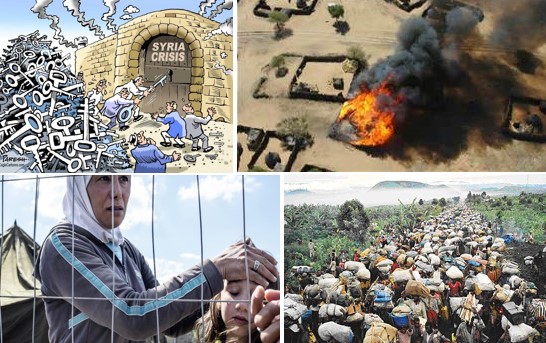
“State sovereignty, in its most basic sense, is being redefined-not least by the forces of globalisation and international co-operation. States are now widely understood to be instruments at the service of their peoples, and not vice versa.”
– Kofi Annan (1999), Former Secretary General of the United Nations
In the shadow of the tragedies in Cambodia, Rwanda, Somalia and Kosovo, the world is witnessing the horror of the ongoing and complicated intrastate war in Syria and the smoldering conflicts in Burundi and Ukraine (to name only a few). Calls for intervention to stop flagrant human rights violations have not yielded real results. It begs the question of the responsibilities of the state for the welfare of its citizens and what responsibilities other states have to those impacted by intrastate wars.
The modern state is generally recognized as having emerged in 1648 with the Treaty of Westphalia that ended the Thirty Year War (1618-1648). The state is a pillar of the international community where the sovereign state as the primary and most powerful actor in international relations (Mearsheimer 2001). Keck and Sikkink (1998) argue, however, that the state has lost some of its potency as a political variable and have elevated the role of non-state actors. Further, the authority of the state “is, increasingly, being either shared with, sustained by, or constrained by these proliferating authorities” (Strange 1995, 67). The growth and thickening of international law, therefore, is an important issue as the role the state plays in global politics evolves.
The effects of these changes indicates a reappraisal of the concept of sovereignty and internationalizes the protection of human rights. This may be opening the door for more internationally sanctioned humanitarian intervention particularly when the state is experiencing intrastate conflict. Humanitarian intervention can be defined as the threat or use of force by a state, group of states, or international organization to protect people in the target state (Murphy 1996). Humanitarian intervention also includes those state interventions whose declared goal is to stop or prevent human suffering though the intervening state(s) may have unrelated and/or underlying motives for intervening (Voon 2002). The debate around the issue of protecting of human rights, therefore, juxtaposes the support of universal human rights against the premium of national sovereignty (Booth, 2001). Further, the idea of international human rights law departs from the concept of state sovereignty and the state-centric approach to international law (Brown 1999). Finnemore’s (2003) assertion that post-cold war intervention in states are legitimized when based on humanitarian grounds, not only changes the purpose for which interventions are used but possibly rearranges the concept of sovereignty (see also Ling 2013; Hopwood 2013).
This issue of a third party state(s) intervention can be examined through the prism of two questions. First, what is the status of ‘sovereignty’ if a government exercises authority or acquiesces to actions detrimental to the citizens? Second, can a new paradigm of legitimatized humanitarian interventions be reconciled with the asymmetry of power between states? An examination of the U.S. policy developing out of the Kosovo intervention in 1999 may be helpful in understanding the state’s criteria for supporting humanitarian intervention. Following President Clinton’s speech on U.S. involvement, National Security Advisor, Sandy Berger, offered three criteria underpinning the policy: (a) there must be genocide or ethnic cleansing; (b) the U.S. must have the capacity to act; and (c) a U.S. national interest must be at stake (Brown 1999). It should be noted, however, that the commitment to act does not reflect any international commitment but primarily reflects U.S. interests.
This combination of state foreign policy doctrine and use of force for humanitarian interventions, concerns some states. Smaller and weaker states are concerned that this trend makes them possible targets under the ruse of a ‘humanitarian intervention’ by stronger states (Hall 2013). This dampens clamors for intervention in other troubled states as leaders wonder if they could be next. Even more powerful states have reservation as was seen with Russian opposition the intervention in Kosovo although that did not preclude their intervention on the Crimean Peninsula. In reality, condemnation of or action in support of human rights are not distributed equitably to suspected and known violators (Schachter 1995).
The literature is not short on suggested ways forward. Despite discussions about prevention and enforcement of international law (Wang 2004; Telhami 1995; Damrosch 1993), the focus continues to be on armed interventions (jus ad bellum) and the nexus between protection and international criminal tribunals (jus post bellum). Former U.N. Secretary General, Kofi Annan (Annan 2012), calls for the international community to “devote our energies to strengthening and using those measures short of the use of force. These must include more effective and enforced use of targeted financial, travel, and economic sanctions on the leadership” (para 28). I suggest, therefore, that the primary goals should be twofold. First, preventing the crisis in the first place thereby retaining the integrity of the individual, the state, the U.N. and international law system. Second, building the political will to respond to crisis thereby upholding the world community’s commitment to human rights and international law with force as a last resort. Meanwhile, wars rage and smolder in the hotspots around the world as a seemingly paralyzed international community struggles with sporadic attempts at cease fires and humanitarian aid to victims.
About the author: Harold Young is an Assistant Professor at Austin Peay State University in Clarksville, Tennessee. His research area is Public Law and examines an American and comparative perspective on judicial institutional changes and decision making. In his previous life he was a health communications project manager, a social worker and an attorney-at-law. He can be reached via email at youngh@apsu.edu.
